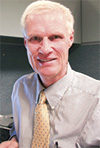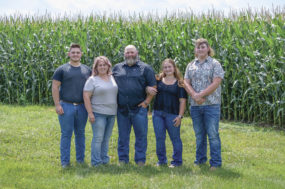October 1, 2011, marked the 10-year anniversary of our presence in Afghanistan. The history of our presence, both military and civilian, will be written for decades to come.
Yet already there are many books and articles in print. All of them seek to explain the huge range of complex and dynamic issues that our country, as well as several dozen others, have been and still are involved with.
My service there was now almost five years ago. I spent a year at Bagram Air Field, just a 20-minute helicopter ride from Kabul, the capital. I often tell people that this year of my federal service was the most rewarding of them all.
Our USDA presence in Afghanistan is still ongoing. By last count, nearly 200 employees have served in Afghanistan and Iraq. Some of us have tours in both countries. I wrote many Progressive Dairyman articles during these tours.
The current reflection of our work in Afghanistan (and Iraq too) runs the gamut. Some report extraordinary success at a local level and even at a higher ministerial level. Some report extensive failures. And there are all ranges in between.
I have written in this column that development in much of the world, and especially in a country like Afghanistan with very different cultures and histories, is hugely challenging.
There is agreement amongst development workers, however, that we should first of all do no harm, then engage with the host government and do so without referencing the size of our funding budget.
Many of us feel that the root problem in our failures is the money, and for Afghanistan, the amount of money. It is in the hundreds of billions of dollars.
Much is written about the lack of tangible evidence regarding these dollars and much is written about the lack of accounting by contractors and contracting officers. Further, we know that some of this money ended up working its way through the bad-guy network even into Pakistan and perhaps other regional states.
In particular, the U.S. Agency for International Development , or USAID , is in the crosshairs of development success. They are responsible for working around the world with large developmental portfolios and, thus, large dollar amounts.
For those of us in the USDA, we do not bring any money to these assignments. Instead, we advise and help shape the agricultural projects or programs by the funding agencies; the two largest are the Department of Defense and USAID.
Many of my colleagues echo what we all know to be the case in Afghanistan (and Iraq too) … there was enough money in the system for us to do our work.
We bring to the mission, therefore, subject matter expertise. The military, through the Civil Affairs Officers, have skills of course, but embedding USDA expertise helps them make sure money is spent on well-thought-out projects or programs.
Our work with the USAID mission is similar … we bring experience of working on farms and working with farmers to the mission, along with academic training, which helps the developmental officer design and implement sustainable projects and programs.
So while money is usually available, the methodology for designing and implement our work is scattershot. Unlike the military, with its many field manuals and doctrinal publications, we do not have these on the civilian side.
We are, quite simply, left to our own ideas once we finally reach our destination of a forward operating base or perhaps the embassy.
Our State Department and USAID colleagues also find themselves working in a challenging environment without a set of standard operating procedures. For many of us, our exposure to Afghanistan was our first true embed with the military and our first long-term assignment in a country very different from ours.
My take on our work there is we are just another in a long line of civilians that have worked in Afghanistan.But I submit we did the best we could with what we had to work with.
Many writers are now making the case for more failures than successes, and the causal factors are the money, the leadership, the assignment rotations, the lack of in-country knowledge, little continuity between those rotating out and those coming in and even knowing what success is. These are valid, I admit.
Yet for many, many of us, these assignments were profoundly rewarding – personally and professionally. Many of us went on to serve elsewhere – for me, Iraq and then Pakistan.
Some came home and returned to their cubicle or office and tried to once again think about domestic challenges. Often there are sessions set up for us to record our experiences and then, from these, answer the question: What were the lessons learned?
And what are these lessons learned?
One of the important lessons is that we surely need to include a thorough examination of the physical and human environment.
Development includes the tangible things, like buildings and structures, but just as important is the social knowledge of a village or town or entire region. In fact, we must engage local people and learn from them instead of telling them. We all know that our presence in a country is short-term.
The local people, whether government official or small farmer, will be here long after we are gone, and further, will have to be comfortable with what we are together trying to do.
Another lesson is the ability of the local people to absorb or utilize what we together have decided to do. This is done (very early on) by thinking about development as an end state of outcomes and not outputs.
Practically, this means we do not just install a drip irrigation system as an output … rather we think about the expected outcome of training the farmer to implement irrigation water management and wise crop selection.
We might suggest that the training component is delivered by the local extension staff, for instance. The point is that before we begin our assignments, advisers should know something about outputs and outcomes.
A third lesson is one that seems obvious in principle but is a real challenge in a war or reconstruction environment. And that is personalities and levels of authority. Unlike the military with rank and very clearly defined levels of authority, we in the civilian sector do not have these clearly defined.
Therefore, in the field, we often find ourselves with strangers at our side, with different ideas, backgrounds and personalities. Sometimes these clash with our own ways of doing things.
Progress slows, of course, and in some cases may even stop. The authority component is problematic, too. Who makes the decision? Who can negate a decision? Who even gets to contribute? These are impediments in all group settings, but if they are manifest many time zones away, then we squander resources and time.
There are dozens of other lessons learned. But in the end, we try. For the next assignment, we learn from these lessons and mitigate what does not work, keep what does and then deliver a project or program that is sustainable and wanted by the host government.
One way to do that is not go to the local people with a dollar amount. This does not work. Rather we design and plan, then once everyone agrees what the outcome will be, then we find the funding.
And for me, defining the outcome we seek, together, is a lesson that we just have to get right. PD

-
Mike Gangwer
- Agricultural Scientist
- USDA-NRCS
- Email Mike Gangwer




